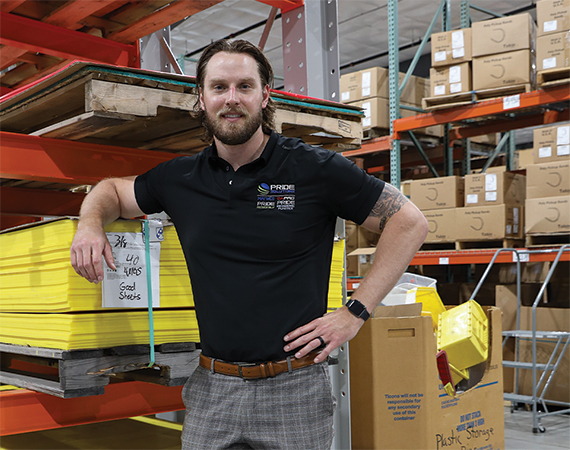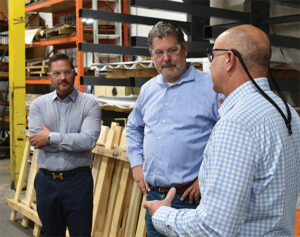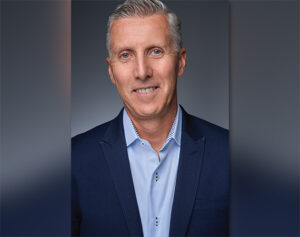When Jack Daggett enters a room, it’s hard not to imagine him back in his playing days.
The current president of Pride Solutions in Hutchinson once suited up on the defensive line of the St. John’s University Johnnies, a legendary Division III football program in central Minnesota. A standout player at Hutchinson High School, playing football at St. John’s gave him a chance to stay close to his family — and close to the legacy he’d one day carry on.
At 6-feet-7, Daggett towers over just about everyone. And he prowls the halls and shop floors with the quiet confidence befitting the leader of a company that gets its name from the king of the jungle: the lion.
But Pride Solutions’ story isn’t one built around Daggett’s Thor-like appearance. Instead, it’s built upon a collaborative and inclusive approach to improving the company through enhanced productivity, sensible growth, and a responsiveness to customer needs. And it doesn’t hurt that the man on top has learned from a legend in the central Minnesota manufacturing scene. Jack is the son of Tom Daggett, the owner of Hutchinson Manufacturing and Pride Solutions. After grooming his son to take over the company, he’ll soon hand over the reins to Jack. Those will be big shoes to fill.
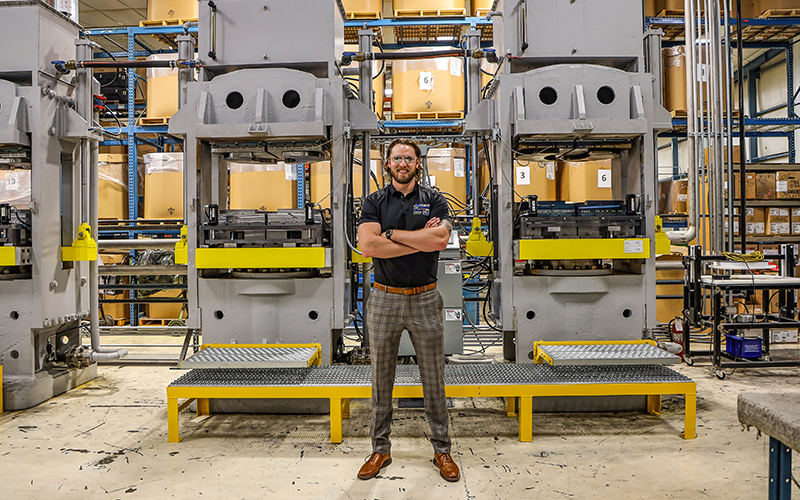
Under Jack Daggett’s leadership, Pride Solutions (which comprises four different business units that operate in the compression molding and plastic fabrication environments) continues the growth and success started by his father. That growth includes a boom period during the COVID years. One product that saw major sales growth is an after-market plastic shell that goes on snowmobile skis. As a symbol of pride, signed posters from some of the world’s top snow racers line the walls of one area of the shop. This product, Daggett says, is in high demand by racing teams all over the world.
But the biggest seller is something a little less sexy yet arguably much more important: the G4 Stalk Stomper, which protects farm combines from damage by genetically modified corn stalks that can wreak costly havoc on a combine.
Daggett says this product is the company’s top revenue producer.
“The new GMO corn is really rigid. When it gets harvested, some of that stock is still sticking out of the ground and it damages tires and tracks on combines. Those tracks are extremely expensive,” he says. “The G4 bolts onto the back of a corn header and flattens that stalk after it’s harvested but before it gets to the tires. It shatters it and bends it over so the tires are safe. It’s by far our largest product, and there’s a lot of labor that goes into it.”
As Pride Solutions continued to grow, Daggett says the chinks in his company’s armor began to be more obvious. That’s when he sought the help of Enterprise Minnesota. The company could have undertaken an expansion without a consultant’s help, but Daggett says his gut told him guidance from someone with experience was the better move. Now they’ve doubled the company’s footprint in Hutchinson and have done so, as Daggett says, with an eye on “growing smarter, not just bigger.”
Same goes for their plans to pursue an ISO certification. They could have tried to handle it in-house, but Daggett says getting expert help was one of the best business decisions he’s ever made.
You might say he and the rest of the Pride Solutions leadership team chose to pursue efficiency and profitability by remembering the advice of a good coach and mapping out a proven and solid game plan.
Lawn boy
Like many men who take over a family business, Daggett began the old-fashioned way: by mowing the lawn and mopping the floors.
But he didn’t mind. At least not much. He says he understood all along that just because he was the owner’s son he wasn’t better than anyone else. And doing those jobs gave him an appreciation for the idea that everyone’s role contributes to the team’s success.
“It was pushing a broom, trimming parts, yard work, inventory — that kind of stuff,” he says of his summers working for his dad. “It was good, honestly, growing up doing some of the not-so-fun jobs. I enjoyed it. I learned a lot more about the businesses, rather than coming in fresh out of college.”
Eugene and Doris Daggett, Jack’s grandparents, started Hutchinson Manufacturing in 1953. They manufactured picnic table frames and clothesline poles, and the company saw steady growth. Their son, Tom, became general manager of the company in 1978. By 1991, he became president.
Under Tom’s leadership, Hutchinson Manufacturing became a major player in central Minnesota’s manufacturing scene. Employing as many as 200 people, Hutchinson Manufacturing specializes in metal fabrication and for years has secured U.S. Department of Defense contracts. They produce custom parts, including nuclear and industrial metal fabrication.
Tom Daggett sold Hutchinson Manufacturing seven years ago when he retired.
Pride Solutions’ genesis goes back to the 1970s with a company called May Wes, and that name remains as one of the companies under the Pride Solutions umbrella. Launched on a farm, May Wes was the first company to create a plastic skid for a corn combine header — the precursor to the G4 Stalk Stomper. In 2002, May Wes, which by this time had changed its name to Plastic Specialties, filed for bankruptcy and shut down production. When they did, there were still finished products in the shop waiting to be shipped.
Daggett’s father purchased the company out of bankruptcy and soon brought back most of the workforce.
The elder Daggett took over Plastic Specialties conditionally: if, within a few months, he didn’t like what he saw, he was prepared to cut ties. But that never happened, and today May Wes remains the company’s producer of agriculture products, including the lucrative G4.
Tom Daggett liked what he saw, but changed the name. Jack Daggett says his father appreciated the strength behind the idea of a lion, and so chose to call this new company Pride Solutions.
Watching his father bring a once-thriving manufacturer back to glory made an impression on Jack Daggett.
“I always knew that I wanted to come back and work with dad in some fashion,” Daggett says. “We’re very close and he’s been a great mentor to me over the years.”
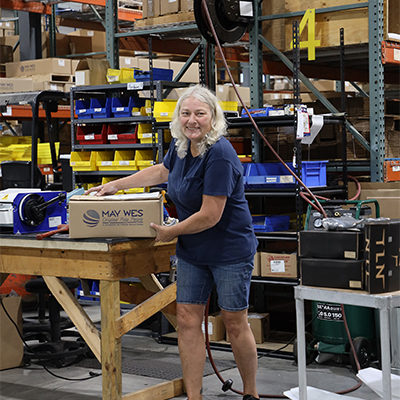
In addition to May Wes, the other companies under the Pride Solutions pride are: Pride Engineered Plastics, Pride Assembly, and C&A Pro (where the snowmobile ski parts come from).
The products Pride Solutions makes for snowmobiles are responsible for some substantial growth in recent years.
Silver lining
When COVID hit, Daggett says the company leadership braced for lean years. But just the opposite happened.
Instead of refusing to leave their homes, many took the pandemic as an opportunity to get reacquainted with nature. And for some, that meant buying a snowmobile.
“I was concerned that we weren’t going to sell anything. I mean, we sell snowmobile skis; who’s going to buy snowmobile skis in a global pandemic?” Daggett wondered. “Turns out, a lot of people! No one saw that coming.”
Pride Solutions employs compression molding using ultra-high-molecular-weight polyethylene (UHMW), a material that resembles silica sand and is known for its strength. They use the same process in manufacturing the G4 Stalk Stomper.
The boost in outdoor recreation interest resulted in a boost in sales for Pride’s ski products. And, Daggett, while declining to offer revenue figures, says the business’ size doubled from 2020 to 2022. The company’s workforce increased from 25 to a high of 40. All that business created a problem, the kind of problem that’s good to have: They needed more space.
Enterprise Minnesota consultants helped them efficiently map out a new 20,000-square-foot facility. They included logic in the design, meaning everything would have an efficiency-based reason for being where it was.
Daggett points to the shipping department to illustrate.
“Before we added on, shipping and receiving had one dock door, and that was difficult at times. In the new building we put two more in,” he says. “We’d have trucks backed up in the lot and that created delays.”
On a walking tour of the shop, he passes by an employee named Kent whose work life has been improved by giving him a proper space to operate in.
“This is Kent. He’s our assembly lead at C&A Pro skis,” he says. “Before, he was essentially putting these together in a back corner. Now he has everything he needs right here. The efficiency gain has been tremendous. And it’s just been great. He can actually be organized and efficient.”
The new efficiency effort began when Enterprise Minnesota business growth consultant Greg Hunsaker challenged the team at Pride Solutions to visualize the “why” of their operations. Hunsaker had them make printouts of the space as well as required structures that needed to be inside. Daggett jokes that they called the pieces “paper dolls” but admits the idea succeeded in helping them see how best to craft the space.
Design can make or break a workspace. Designed poorly, and workers can spend chunks of time walking around searching for tools. Designed wisely, and all such time-wasters can be eliminated.
“You can fill 20,000 square feet pretty darn quickly, but is it efficient?” Daggett says. “And that was really the main point; are we laying it out efficiently?”
Documentation
In addition to expanding the company’s footprint, Daggett also wanted to expand the company’s professionalism. To do it right, they needed an ISO certification, specifically ISO 9001:2015, which focuses on quality management systems.
Daggett, who had experienced an ISO certification earlier in his career, says Pride Solutions got a rude awakening when a customer asked them to conduct an informal audit.
“That was the straw that broke the camel’s back,” he says. “We did not do very well,” he admits. His team engaged Enterprise Minnesota to achieve its ISO certification. “I’m really glad we didn’t try to do it ourselves,” he says.
Daggett says the process uncovered deficiencies in their documentation and management systems. “Our documentation was lacking from each operation,” he says.
The improvements, he says, will ultimately make them a better and more profitable company.
Part of the leadership team’s discussions was about the cost of getting an ISO certification. On the front end, it’s a substantial investment. In most cases it can cost around $50,000.
But Daggett says a better way to look at it is what will the cost be if you choose to not do it. How many clients will you lose? If so many areas of your documentation are inefficient or subpar, how long will it take for those inefficiencies to add up to real money?
“It’s not an inexpensive thing. There’s also the time investment of our people. Every two weeks, it’s a four-hour meeting in the morning and it can be anywhere from three to 10 of our people in it. But at the end of the day, we’re going to improve. It’s going to help us in the long run. Essentially, it’s an investment in our future and investment in growth,” he says. “Also, if we want to continue to operate and get more and better clients, this has to get done.”
Initially, Daggett says there was some pushback about changing processes. And some workers may have been a little intimidated by the unknown, as well as the scope of a project that promised to delve into and potentially change/improve every part of the way a company operates.
But as more people understood the process, he says, the more people started to get excited about their own jobs and the company’s performance overall.
“Once people learn what this is and that it will benefit us in this way or that way, then they understand that it’s not just extra work, it’s not just more paperwork,” he says. “It’s how we structure our business and how we go about doing things. It’s not necessarily ‘in addition to.’ It’s maybe just changing a little bit on how we’re currently doing something for our betterment.”
Return to the Winter 2024 issue of Enterprise Minnesota® magazine.
